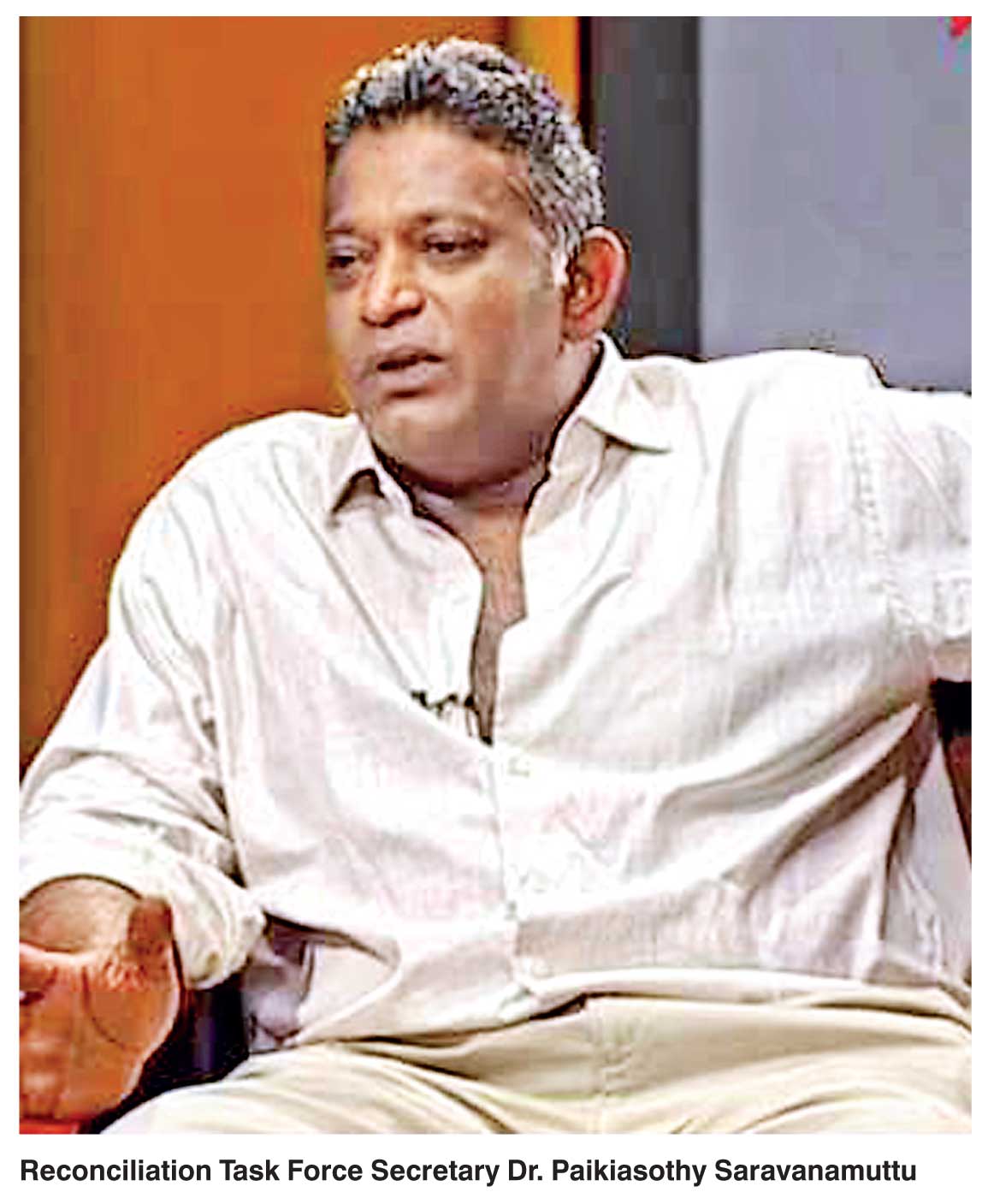Tuesday Feb 17, 2026
Tuesday Feb 17, 2026
Monday, 9 January 2017 00:00 - - {{hitsCtrl.values.hits}}
 The Yahapalana regime has a pro-imperialist rightwing, and President Sirisena isn’t in it. The rightwing is headed by the Prime Minister and is supported by an Old Boys network, a few politicians, a score of civil society ideologues and some foreign embassies, agencies and capitals.
The Yahapalana regime has a pro-imperialist rightwing, and President Sirisena isn’t in it. The rightwing is headed by the Prime Minister and is supported by an Old Boys network, a few politicians, a score of civil society ideologues and some foreign embassies, agencies and capitals.
While the rock hefting lads and ladies in the Green Goon camp at Hambantota recalled us to the authoritarian violence that has characterised the UNP from 1947 (Rohana Wijeweera’s father was paralysed by UNP violence at the ’47 election) through the 1977 regime, nothing symbolises the contradictions of the Yahapalana regime as much as the report produced by the Task Force that Prime Minister Ranil Wickremesinghe chose to appoint on a subject of the greatest importance.
That act, that choice and its output and outcome, provide the clearest evidence of the nature and dynamics of this regime, the attitude of its rightwing to the most important problem facing the country (interethnic reconciliation) as well as the most significant historical fact of our lifetimes and the island’s contemporary history (the Thirty Years War).
So we had the world’s tallest Christmas tree which wasn’t a Christmas tree. Then we had the Volkswagen factory which wasn’t a Volkswagen factory. Now we have the Reconciliation Task Force report – in effect the Saravanamuttu Report - which is not a report for reconciliation.
I say this with reason. The report itself provides the evidence and the argument. Two numbered paragraphs in the executive summary of conclusions and recommendations state that the Sri Lankan armed forces testified in favor of the Government’s reconciliation initiatives while being heavily against the accountability component - the reopening of wounds through special courts and the investigation of war crimes allegations - and staunchly defending its conduct of and in the war. The military had held that such an approach would be counterproductive and actually widen the gap between the communities.
A third numbered paragraph in the executive summary of the report’s conclusions and recommendations also states that the Sinhala community was opposed to the accountability architecture and special judicial mechanisms.
Reconciliation Task Force
So what does this mean? It means that in the teeth of strongly contrary argumentation and urging by a victorious, large Sri Lankan military as well as the Sinhala majority which constitutes almost two thirds of the Sri Lankan people, the Task Force appointed by the Prime Minister made recommendations for Special Courts and a Special Prosecutor’s office, with foreign participation as judges and prosecutors, and further urged that our laws be revised to include international law and that our military be prosecuted for crimes against international law, including war crimes and crimes against humanity, which may have been committed during the war.
 The Reconciliation Task Force Report recommends, in effect, nothing less than the internationally supervised legal lynching of the Sri Lankan armed forces and its wartime political leadership.
The Reconciliation Task Force Report recommends, in effect, nothing less than the internationally supervised legal lynching of the Sri Lankan armed forces and its wartime political leadership.
The Task Force seems to have believed that such was its sacred task! The morally grotesque recommendations of this Task Force reveal the degeneracy of the so-called civil society intelligentsia that comprises and undergirds it.
Some “reconciliation” this, which rides roughshod over the sentiments of the vast majority of the citizens of a country, as noted even by the Report itself! Some Reconciliation Task Force, which gives short shrift to the views of a popular, all-volunteer armed forces which never overthrew democracy but protected it against all totalitarian comers, South and North, Right and Left, won a war waged by the world’s only terrorist movement powerful enough to have a navy and an air arm, rid the country of the scourge of separatist terrorism, re-unified its territory and restored peace!
One might have thought that reconciliation would involve limiting oneself to those proposals that all communities agree with, or fashioning some proposals that stood at a midpoint between the contending views of communities while understanding as Lord Soulbury did that in a democracy one cannot stand at the exact midpoint between a large majority and a fairly small minority. The Reconciliation Task Force has done neither. Instead the Task Force’s idea of reconciliation between ethnic communities in Sri Lanka is to produce recommendations which virtually echo those of Zeid al-Hussein, the UN High Commissioner for Human Rights.
Thus the Task Force’s idea of reconciliation is to erect Special Courts and a Special Prosecutor’s Office to try the armed forces for its conduct during the last stages of the war. The last stages are the stage of strategic counteroffensive, when after 30 years the Sri Lankan military was poised to win the war and went on to do so. This ‘last stage’ of the war and its outcome are to be celebrated for millennia, not subject to investigation.
Office of a Special Prosecutor
The Reconciliation Task Force wishes to have an Office of a Special Prosecutor to prosecute a legitimate, constitutional military of a practicing democracy. It wishes to prosecute those who fought against a fascist terrorist enemy, a totalitarian enemy that eliminated all dissent within its ranks and within Tamil politics, a terrorist enemy that slaughtered women and children asleep in the so-called border villages and exploded bombs on commuter trains and buses.
Given the composition of the Task Force, it is hardly surprising that it made the recommendations it did. The Secretary is Dr. Paikiasothy Saravanamuttu who has hardly distinguished himself by his sage-like detachment during Sri Lanka’s conflict and its aftermath. His track record is one of conspicuous lobbying in Geneva (unsuccessfully on my watch) for an international inquiry into the war and its closing stages. A few months ago he authored an article in the English-language Lankan press which argued that public opinion polls show that the Sinhala voter will divide in such a manner that they will not vote in quite the way they did on 8 January 2015 for the Yahapalana ticket, and that therefore the minority voters, especially the Northern and Eastern voters, must be actively incentivised to turn out at least as massively as on 8 January 2015 to vote YES at a referendum on the Constitution, by promising them an oversize autonomy package in the new Constitution.
It is someone with these obvious minoritarian biases who was picked by the PM as the Secretary of the Task Force on Reconciliation.
What is even more of a travesty is the composition of the Reconciliation Task Force. In sharp contrast to the LLRC, not a single member has held positions of responsibility in the Sri Lankan state and distinguished himself or herself in the service of the country.
Still more glaringly, of the 11 members, six, i.e. a majority, belong to the ethnic/ethno-religious minorities. In other words, recommendations of reconciliation between the constituent communities of Sri Lanka were sought from a Task Force that far from being an accurate representation of the composition of the country whose communities it seeks to reconcile, actually inverts the actual composition of our society and is comprised of a majority drawn from the minorities. Any person who did not know the demographics of Sri Lankan, would conclude, looking at the Task Force on reconciliation, that Sri Lanka had a (slim) majority of Tamils and Muslims and a (large) minority of Sinhalese! GG Ponnambalam called for 50:50 and it was rejected by both D.S. Senanayake and Lord Soulbury. Prime Minister Ranil Wickremesinghe has obviously gone further than that which PGG Ponnambalam demanded for the island’s combined minorities, and appointed a committee that accords more than 50:50 to the combined minorities!
The Reconciliation Task Force was appointed by Prime Minister Wickremesinghe and its hideous report was presented to former President Chandrika Bandaranaike Kumaratunga in the presence of Minister of External Affairs Mangala Samaraweera. This then is the troika that seeks to persecute and punish the Sri Lankan military for winning its war of liberation, blacken the name of the anti-fascist, anti-separatist Sinhalese community which fought to keep the country together, whitewash the Tigers by accepting allegations of war crimes, and impose the vision and perspective of minoritarianism on Sri Lanka.
2017 is the year to begin the national liberation struggle to take our country back from this clique. It has already begun, aptly enough in the Deep South, the Ruhuna, days ago.